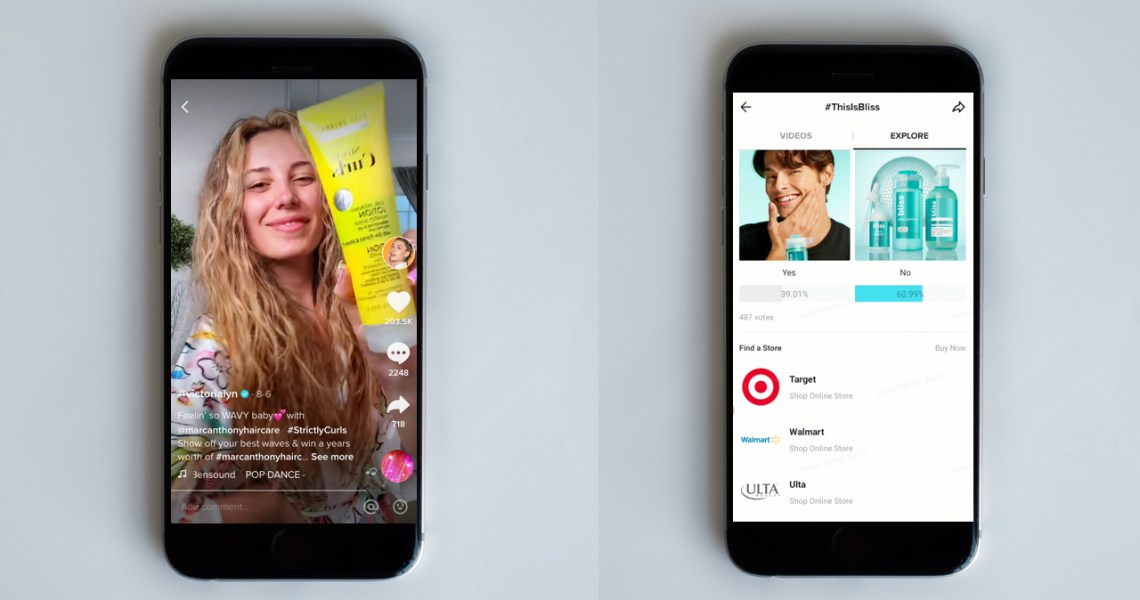As brands and users have rushed onto TikTok in 2020, the short video app has been adding new advertising functionalities as it scales up.
A growing contingent of beauty brands have entered the “billion-view” club by tapping into TikTok’s flagship sponsored hashtag challenge feature over the past year. With the introduction of Shopify capabilities in late October, as well as a “Hashtag Challenge Plus,” TikTok sponsored challenges have become key to earning gigantic engagement numbers on the platform.
The scale of views on TikTok challenges has ballooned from millions to billions in 2020, with brands like E.l.f., Revlon and Maybelline among those surpassing 10 figures in campaign views. Hair-care brand Marc Anthony, for example, earned over 3.1 billion views on its official #StrictlyCurls hashtag challenge launched in August 2020. This was a massive leap from last year, when the #StrictlyCurls hashtag took off organically with a viral video tutorial that generated 8.1 million views and a 160% year-over-year sales increase for the brand in June 2019.
“We borrowed from a lot of the extreme success that we saw in the spring of 2019,” said Kimberly Konstant, vp of marketing of brand and innovation at Marc Anthony parent company MAV Beauty Brands. For the 2020 challenge, the brand worked with the TikTok team to have the campaign appear on its homepage for three days and in ads in-feed for six days.
“A TikTok hashtag challenge allows your brand to truly own a piece of TikTok for three days,” said Dave Rosner, evp of marketing at digital talent network Collab, who calls the hashtag initative a “monster program.” “If you put all the right pieces in place, the opportunity for billions of views is 100% there on TikTok, and those are numbers you just don’t see on other platforms.” Collab worked with Bliss, along with creative agency Movers + Shakers, on the September #ThisisBliss campaign that has received over 6.6 billion views and utilized TikTok’s new Hashtag Challenge Plus format. The brand worked with top TikTok influencers including Loren Gray, Avani Gregg and Hannah Balanay, among others. Collab also enlisted various TikTok content houses to “compete” in the campaign.
“Hashtag Challenge Plus” campaigns offer an “Explore” tab with product and merchant information, allowing users to click items to purchase. To roll out the feature, TikTok created a #ShopBlack campaign from November 10-15 to promote Black-owned businesses selling through Shopify. They included beauty brands Topicals, Rosen Skincare, Adwoa Beauty and 54 Thrones.
The app’s top influencers are a key part of boosting campaign engagement. Konstant said that, for the Strictly Curls campaign, it was important to have a variety of hair types featured. Influencers including Victoria Lyn, Giovanni Ferrer, and model Brinkley Garner were included.
Ad position: web_incontent_pos1
The environment for brands on TikTok is shaping up to be pay-to-play for most, as sponsored challenge views often far surpass a brand’s organic followers. Marc Anthony Hair has 17,400 followers, and Bliss has 89,000. Having an official partnership with TikTok is helpful to brands for both paid visibility and support from the app on campaigns.
“With TikTok, when you’re working in concert with them, they give you a lot of guidance and insight on how the platform bends to the users,” said Konstant. “A lot of brands — probably us included, at some point — try to push the message versus create it within the space in which it’s supposed to thrive. TikTok really guided us in ways to help the brand experience be really germane to the platform.”
“In order to come up with great ideas that work on TikTok, you really have to study the platform every day,” added Rosner. “The trends are changing so quickly that when you’re working with clients, you have to understand what’s happening on the platform — not in three months, but right now when you launch it.”




